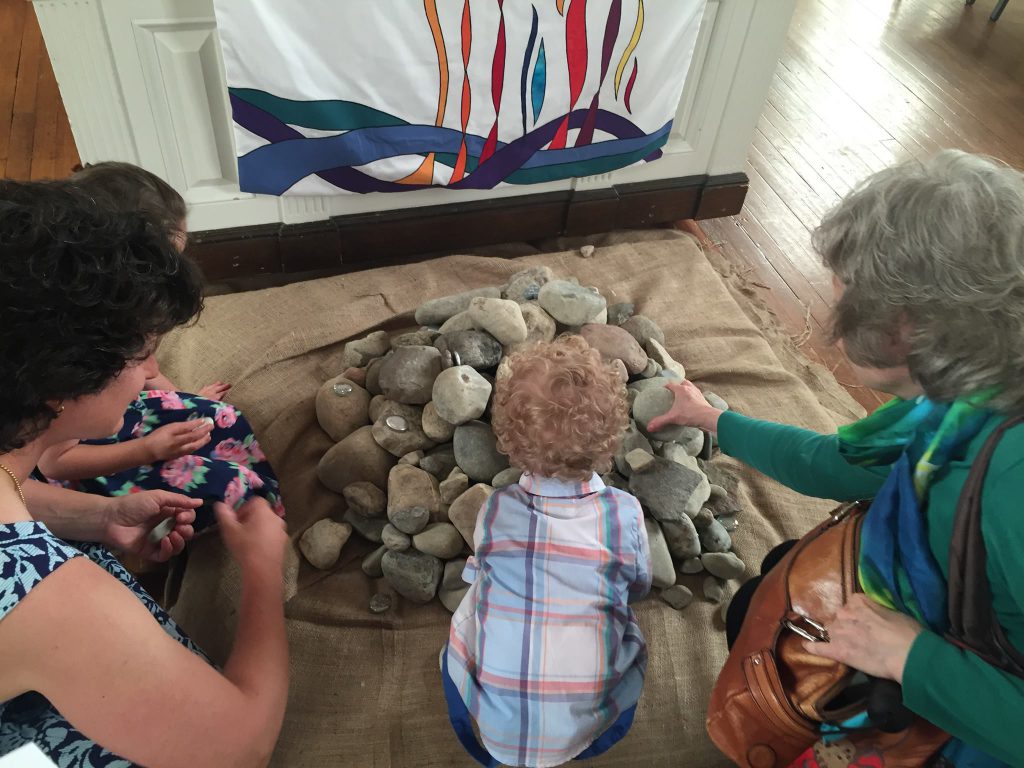Recently, I joined with a congregation which has taken a radical step: giving their building over to be redeveloped as affordable housing with a potential gathering/worship space on the first floor. It was their last worship gathering in the place where they have worshiped for many years. Over the past few months, they have been sharing memories and milestones and meaningful traditions as they slowly built an altar made of rocks placed alongside the sharing of these memories.
As a part of this last worship service, everyone picked up one of those rocks and carried them to the temporary gathering space where they will gather as a faith community for the time being. Those rocks symbolize some important things about where they’ve been as they journey into a new future that is as unpredictable as it is full of possibilities.
Five Questions About Tradition
All of this got me to thinking…what “stones” are important to take into a Fresh Expression? What traditions should we be taking into the edges of mission, and what traditions just don’t translate at all in a post-Christian context?
What traditions should we be taking into mission, and what traditions just don’t translate?
Tweet this.
Does the meaning of the tradition translate into the new context?
There are things we consider “traditions” in existing church that translate well into Fresh Expressions, and there are other traditions we may need to leave behind. The tangible expressions of the Lord’s Supper and Baptism are powerful traditions that translate deeply in every context of Church. Christmas Eve candlelight is a tradition that resonates consistently across Fresh Expressions and existing churches alike.
On the other hand, ancient liturgies work well in some Fresh Expressions, but don’t fit in others. A traditional Sunday School with an identified teacher may need to give way to a more conversational, participatory conversation about Scripture. The annual congregational meeting potluck dinner may need to find a new expression of regular table fellowship in homes. Mission Sunday will most assuredly shift to rhythms of ongoing life on mission with God in everyday life, work, neighborhood, and family.
Are you taking it into the mission context because it means a lot to you or because it could mean something to the people with whom you are on mission?
Remember…this is not about you and what you like. It is about what can connect with those whom God has sent you to do life with. Singing hymns from a beloved hymnal may be a tradition you love because it reminds you of important times in your life of faith. However, forcing that tradition into a new setting may or may not be helpful for the people with whom you are engaging. Is this a tradition that meets them where they are and helps them journey toward God, or is it a bridge too far that will get in the way of their unfolding engagement with faith?
Does it bear witness to something about the Triune God that needs to find expression in this new context?
In my tradition, a time for confession of sin is a regular practice of the gathered community. In many existing congregations, that means a written prayer that worshipers recite together. While a corporately recited unison prayer may or may not translate well into a Fresh Expression, the power of being honest and vulnerable before God, and claiming God’s promise of forgiveness and reconciliation is a transformative faith community practice. Traditions that help a Fresh Expression grapple with the mysteries and promises of the faith are worth pursuing. Which brings me to the next point…
How might this tradition need to be re-interpreted so it is relatable?
Many of our traditions have power, but will require some re-forming so that it is accessible to those with whom we are engaging.
“Passing the peace” is a tradition in many existing congregations. “The peace of Christ be with you. And also with you.” This tradition can seem awkward and forced to those unfamiliar with this tradition. But the power of fellow worshipers engaging with one another, or the power of acknowledging the reconciling love we discover in Christ are values which could be very important as a rhythm of this emerging expression of Church.
How could the intent of this tradition be reflected in the practices of this Fresh Expression? There is a leader who always has a time in the gathering in which people are invited to share stories with one other about a topic related to the upcoming Scripture reading. If the Scripture reading is about Jesus’ calming the storm, people will be asked to share with each other a time that they were on a boat. They have discovered that this practice is much less threatening than the traditional Passing of the Peace, yet still acknowledges and values fellow sojourners on the journey of faith.
What traditions could be powerful in the context of a Fresh Expression if they were reshaped for the sake of those with whom we are seeking to connect?
What traditions could be powerful if reshaped for those we are seeking to connect?
Tweet this.
How can you be intentional about communicating the traditions that do find their way into your Fresh Expression?
Assume nothing. People don’t automatically understand the meaning behind traditions.
This Lord’s Supper is not for people who have it altogether. It is for people who recognize they don’t have it altogether and need a Savior.
We dig into Scripture together because we discover who God is and who we are when we allow God’s Word to intersect with our lives.
We take some time to be quiet and imagine ourselves walking towards God, because there are so many loud voices in the world drawing us away from connection with God.
Be prepared to talk about what you are doing and why. Let the meaning of the traditions seep into your Fresh Expression instead of just going through the motions.


